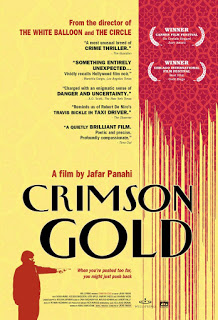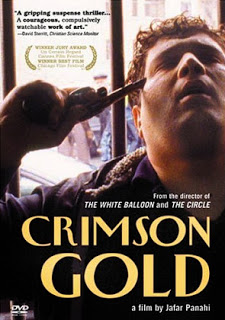In Jafar Panahi's fourth film, scripted by
Iranian director Abbas Kiarostami, he leaves his sly humor on the cutting
room floor and instead gives us a critical slice of Iranian life that is
grim and real. And seemingly as meandering as the motorbike that Hossain
rides in his job as a delivery man - but each little unrelated episode stitched
together makes for a picture of Iran society that could not have pleased
the Mullahs. All quite restrained for the most part.
Hossein and his buddy Ali hang out in teashops, ride through Tehran and both
eke out a minimal living as delivery men of pizza - a decidedly Western food.
Though it is never stated something is a little wrong with Hossein - a veteran
of the Iran-Iraq war - the dead faraway look in his eyes - his lack of responsiveness
- and in fact the actor, Hossain Emadeddin, who is not a professional actor
(someone who Panahi talks about in his film This is Not a Film) is diagnosed
as a paranoid schizophrenic. His large broad shouldered body and slit eyes
always feels slightly menacing on the edge as if something is going to go
badly wrong - an Iranian Lenny perhaps.

His nightly sojourns take him to a block party where the police are waiting
to nab people as they leave for dancing and drinking, to a comrade he was
in the war with, to the son of a wealthy Iranian who is living in this enormous
apartment while his parents are away in America. The son invites Hossein
into the apartment to eat with him and you keep waiting for something to
happen - for Hossein to explode. He feels meaningless in this society and
has no future and it is building up, waiting for a spark.
As seems to normally be the case with Panahi's films it was smuggled out
of Iran and entered in Cannes where it won the Un Certain Regard Jury Award.
It was of course banned in Iran.


